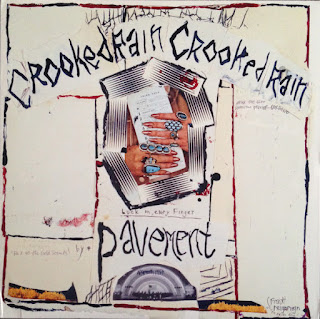Toe - For Long Tomorrow (Album Review)
Toe - For Long Tomorrow
(2009)
My copy: 2022 reissue on green in brown vinyl by Topshelf Records.
Japanese math-rock band Toe reached the pinnacle of their western popularity in 2009’s For Long Tomorrow, which stands as a tasteful fusion of technical rock structures and jazzy arrangements. The ferocity of the drums is often undercut by an unwillingness for the guitar to branch out into denser sounds, but their commitment to dignified layering of clean melodies is impressive when executed well.
The album begins inquisitively with a drone and prickles of synth, leading into the rolling hammer-on riffs of “ショウシツ点よ笛.” The bass often propels the guitars forward with precision bumps, set into the pocket of the tastefully energetic drum patterns. The production is rich and clean, mixing in subtle whistles and claps to keep the temperament playful. The female vocal loop that ties “After Image” together brings the perfect amount of sweetness to balance out their intricate, jazz-tinged compositions that narrowly skirt around dissonance. “エソテリック” is the only song in which the guitars match the intensity of the drums with punkish chugging and faster tempos, leading to a deeper craving for aggression that is never indulged again.
The relaxed, airy RnB flavors of “Say It Ain’t So” provide a necessary break in the layering, though the actual sound is somewhat bland, with performances that lack a necessary energy. “Two Moons” seems to borrow heavily from midwestern emo/math-rock riffing, ending up as a relatively lifeless and imaginative noodle-fest. Duo tracks “モスキートンはもう聞こえない#1,” and “モスキートンはもう聞こえない#2” reinstill confidence in their creativity with nostalgic piano and a hypnotic, polyrhythmic focus on repetition. The dramatic instrumental choruses of “ラストナイト (Album Version)” prove the necessity of dynamics in technical styles of rock, as these moments of release compliment the multi-faceted layering of the verses nicely.
Toki Asako provides guest vocals on “グッドバイ (Album Version),” which stands as the longest track, notable for its distinctly Japanese take on Stereolab (that is, the melodies are far more complex at the cost of some finesse). “You Go” and “Long Tomorrow” rehash core elements of other songs, and feel like inoffensive padding though “Our Next Movement” starts as a surprisingly fun arrangement of various percussive elements before patiently working towards a tenacious climax of woodwind instruments.
For Long Tomorrow almost manages to totally offset its tonal stagnation with expressive writing and appealing layering, but it still feels like there is a certain energy missing deeper into the album. Yet, this complicated take on math-rock/emotional jazz so perfectly oozes a particular charm that it’s hard not to smile while listening to a handful of these clever songs.




Comments
Post a Comment